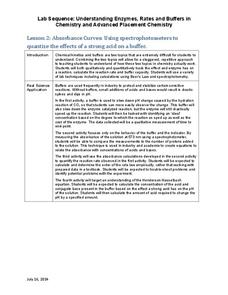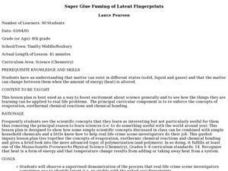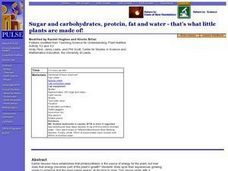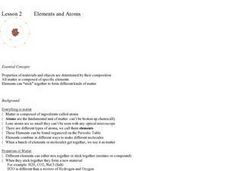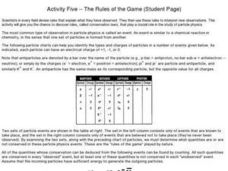Curated OER
Avoiding Carbon Dioxide Emissions from Burning Fossil Fuels
Students calculate stoichiometrically the amount of carbon dioxide that would be emitted from burning a mole of varios alkanes that comprise fossile fuels. If the energy released from burning a mole of these alkanes is known, then the...
Curated OER
Acid Neutralization Lab
Students discuss and design a lab to measure pH of limestone, pyrite, limestone-pyrite mixtures and their control. They have their labs approved by the instructor before they begin. Students preform the lab and explore the acid-base...
Curated OER
Things That Glow: From Fireflies to Quantum Dots
Third graders observe light energy. For this heat and energy lesson, 3rd graders will study the concept of light as a form of energy. Students will examine the different forms of light and the type of energy it produces.
Curated OER
Condensation Polymerization: Preparation of Nylon 6/6
Students participate in a lab activity in which they synthesize nylon 6/6, calculate the percent yield by mass, identify the polymer as thermoplastic or thermoset, and determine the melting point, density and end-product use of the polymer.
Kenan Fellows
Absorbance Curves: Using Spectrophotometers to Quantize the Effects of a Strong Acid on a Buffer
The Henderson-Hasselbalch equation combined logarithmic terms with the application of carbonic acid as a buffer solution. Scholars learn investigate equation and its applications through hands-on experiments. They collect data and...
Curated OER
Dilution and Concentration of Solutions
Future chemists practice laboratory techniques by creating a monochloramine solution. The objectives are to use of dilution, 9concentration, and measurement skills and to prepare a solution that will be used in a water treatment...
American Chemical Society
Man and Materials Through History
From the start of the Industrial Revolution, it only took 147 years for someone to invent plastic. This may seem like a long time, but in the history of inventing or discovering new materials, this is incredibly fast. An informative and...
National Institute of Open Schooling
Ionic Equilibrium
Scientific studies show the older we get, the more acidic we become. The activity extensively teaches high schoolers about acids and bases. By the end of the 14th installment of 36, they can define and explain three concepts of...
Curated OER
Excess Reactant
Junior chemists discover how to calculate excess reactants, handle limiting reactants, and determine percent yield. After background information is provided, step-by-step examples are solved. You can use this detailed slide show to teach...
NOAA
Ocean Acidification
If tap water is more acidic than ocean water, why are we so concerned about ocean acidification? The third installment of a 23-part NOAA Enrichment in Marine sciences and Oceanography (NEMO) program focuses on carbon dioxide levels in...
Curated OER
How Do I Get a Pure Sample of the Molecules I Make?
Students initially engage in online research and consult print materials to identify a compound to produce. Once a selection has been made, individually, students conduct lab experiments to isolate substances. The end product is a...
Curated OER
Unknown Element Project
Students work with a partner to determine the identity of an unknown element based on given descriptions. Groups use classroom textbooks, encyclopedias, and science internet sites to identify their unknown element then write a report as...
Curated OER
Super Glue Fuming of Latent Fingerprints
Students explore latent fingerprinting. They observe a supervised demonstration of the process that real-life crime scene investigators sometimes use to identify latent fingerprints. In addition, they brainstorm ways to improve the...
Curated OER
Baking Soda Rockets
Students make a baking soda rocket out of vinegar, baking soda, and a soda bottle. In this rockets lesson plan, students discuss the liquid, solid, and gas combination.
Curated OER
What is Everything Made of?
Students observe a demonstration on how we see space between water molecules. In this experimental lesson plan students discover what elements make up the things around them and discuss what they learned.
Curated OER
Sugar and carbohydrates, protein, fat and water - that's what little plants are made of!
Students identify photosynthesis as the mechanism by which plants convert sunlight energy into a usable energy source for plant processes. They identify photosynthesis as the mechanism by which plants create a molecule that can be used...
Curated OER
Elements And Atoms
Students investigate the concept of elements and atoms. They conduct research using a variety of resources and use the information in order to create a class presentation. The activity includes specific dialogue and steps for the teacher...
Curated OER
Reading Comprehension Worksheet: Compounds & Elements
In this reading comprehension worksheet, students read several short paragraphs about compounds and elements and then answer several questions about the text.
Curated OER
Periodic Table Lesson Plan
Students describe how elements are arranged on the periodic table. They compare metals, nonmetals, and metalloids based on their properties and on their locations in the periodic table. Students describe the differences between a...
Curated OER
Water and Diffusion
In this water and diffusion activity, students will explore the characteristics of water and the water molecule. Students will also answer questions about diffusion and the movement of materials due to concentration differences. This...
Curated OER
Ancient Atomic Theories
Studdnts research ancient texts and compare ancient Greek atomic theories, as used in the production of silver, to modern theories.
Curated OER
EGG-cellent POLYMER PACKAGING DESIGN
Students investigate the concept of a polymer using an experimental design of protecting an egg in a bookbag. They test the properties of polymers and form an educated solution to the proposed problem. Then they describe the steps used...
Curated OER
Particle Physics- Activity Five
In this particle physics worksheet, students use graphs and tables to predict the particles formed during a specific observation event. They complete 5 multi-part fill in the blank questions.
Curated OER
A Walk in the Woods
Eighth graders observe and identify the different levels of the forest. In this forest zones lesson students observe, identify and name a variety of forest components and describe how humans impact the forest ecosystem.






